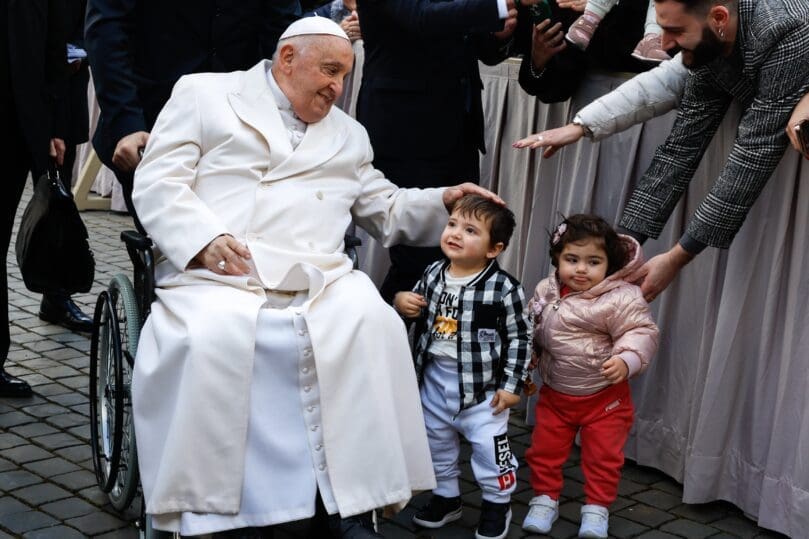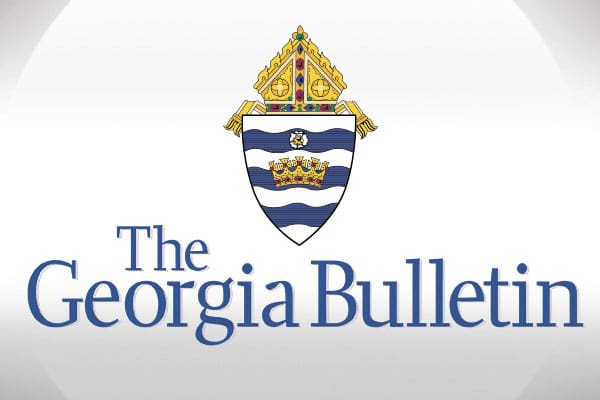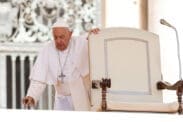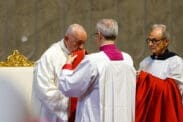 CNS photo/Lola Gomez)
CNS photo/Lola Gomez)Vatican City
Pope, still recovering from illness, urges the prideful not to judge
By JUSTIN McLELLAN, Catholic News Service | Published March 6, 2024
VATICAN CITY (CNS)–Pope Francis urged prideful people to recall one of Jesus’ moral commandments to “never judge.”
The sin of pride “ruins human relationships” and is an evil that “poisons the feeling of fraternity that instead should unite humanity,” the pope wrote in the catechesis for his general audience in St. Peter’s Square March 6.
Still recovering from illness, Pope Francis told visitors an aide would read his talk because he could not read well due to a cold. The pope entered St. Peter’s Square in the popemobile and wearing a coat in the brisk weather, but he struggled to lift himself into the vehicle after the audience and instead left the square using a wheelchair.
After his general audience Feb. 28, the pope was taken to a Rome hospital for what the Vatican said were “diagnostic tests,” and during an audience March 2, he told people he had bronchitis.
Pope Francis took the microphone only for his initial and final greetings. At the end of the audience, he renewed his invitation “to pray for the populations that suffer the horror of war in Ukraine, in the Holy Land and in other parts of the world.”
“Let us pray for peace, let us ask the Lord for the gift of peace,” he said.
In the main speech read by Msgr. Pierluigi Giroli, Pope Francis said that “the prideful (person) is one who thinks he or she is much more than he or she really is; one who frets to be recognized as greater than others, always wants to see his or her own merits recognized and despises others by deeming them inferior.”
The pope’s speech cited St. Gregory I, the seventh-century pope who called pride the queen of all vices.
Hidden within pride, Pope Francis wrote, is the “radical sin” of claiming to be like God. He explained that the sin of Adam and Eve recounted in the Book of Genesis was caused by pride, since the serpent that tempted them said that by eating the fruit of the tree of knowledge “you will be like gods.”
Those who suffer from an inflated sense of pride, the pope wrote, are quick to make “irrevocable judgments on others, who seem to them hopelessly inept and incapable,” and he explained that prideful people “forget that in the Gospels Jesus assigned us very few moral precepts, but on one of them he was uncompromising: never judge.”
The pope wrote that one knows when he or she is dealing with a prideful person when, by offering a small criticism or even a harmless observation, the other “reacts in an exaggerated manner” and “goes into a rage, shouts, breaks off relationships with others in a resentful way.”
“There is little one can do with a person sick with pride,” Pope Francis wrote, suggesting that patience is the only option when dealing with a prideful person who cannot be spoken with or corrected.
Salvation, however, “comes through humility,” he wrote, which is “the true remedy for every act of pride.”
“It is useless to steal anything from God, as the proud hope to do, because he wants to give us everything after all,” he wrote, urging Catholics to make use of Lent “to fight against our pride.”
After his catechesis, Pope Francis greeted a delegation of bishops from American Methodist churches who had met with officials from the Dicastery for Promoting Christian Unity March 5.



